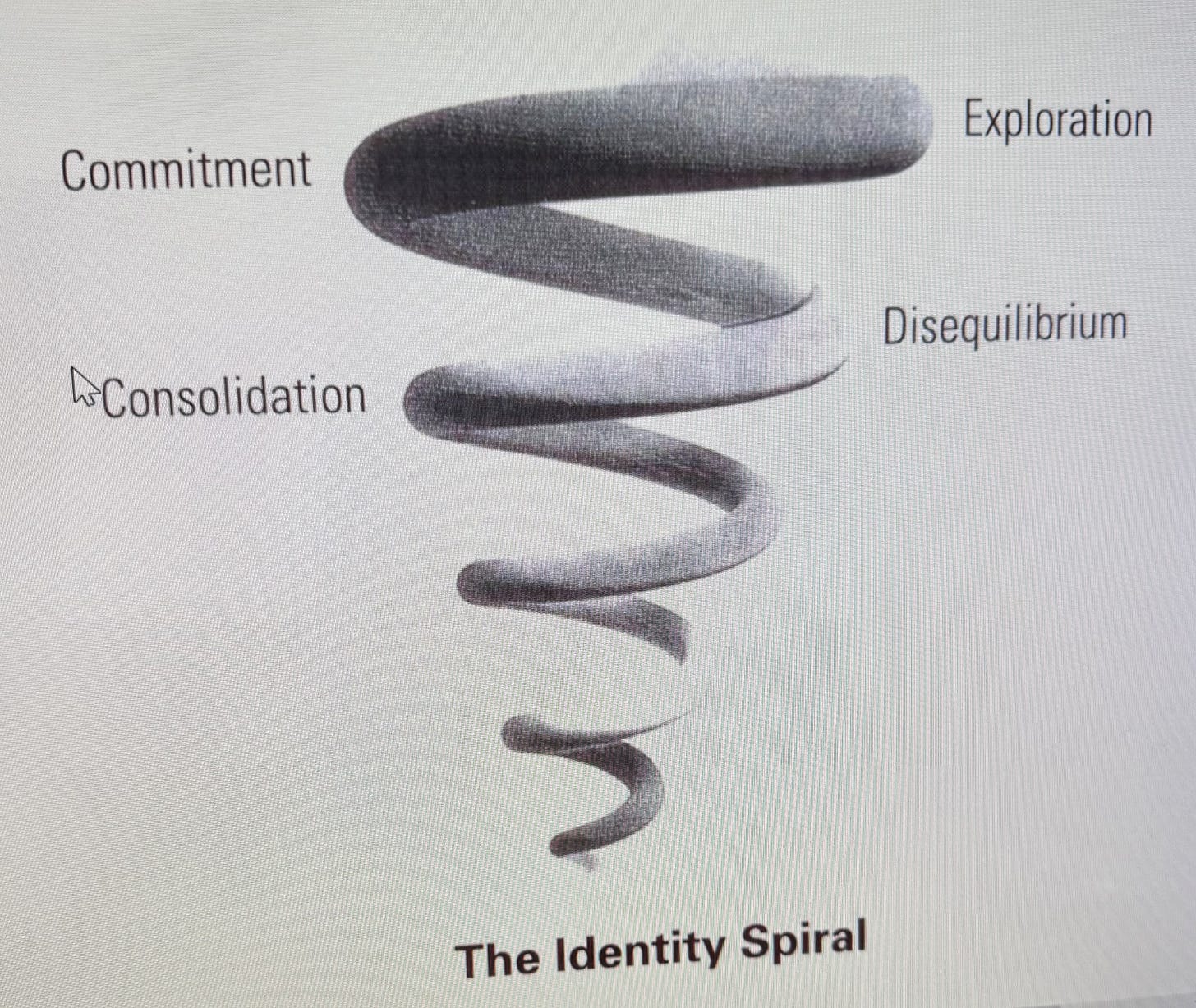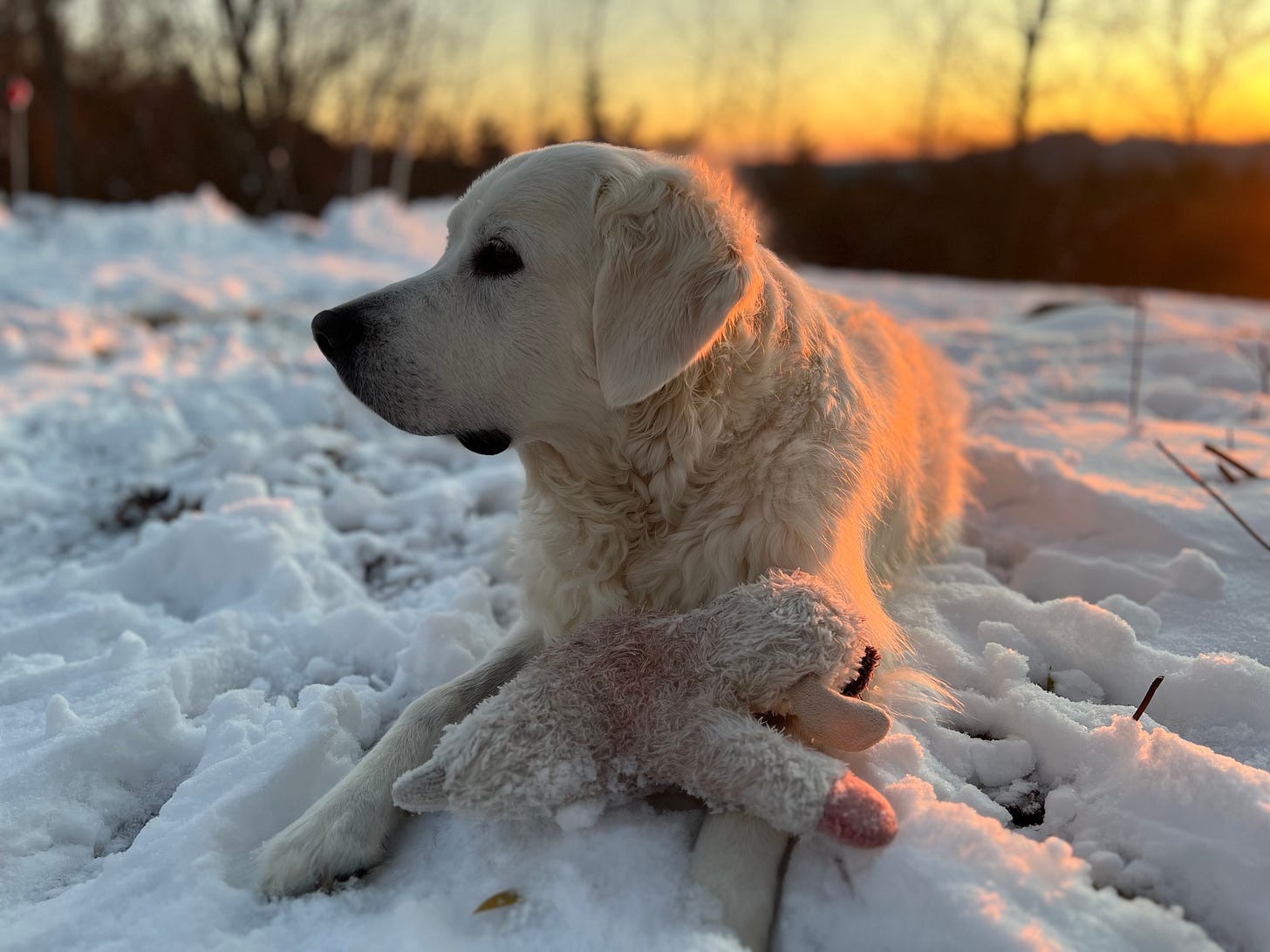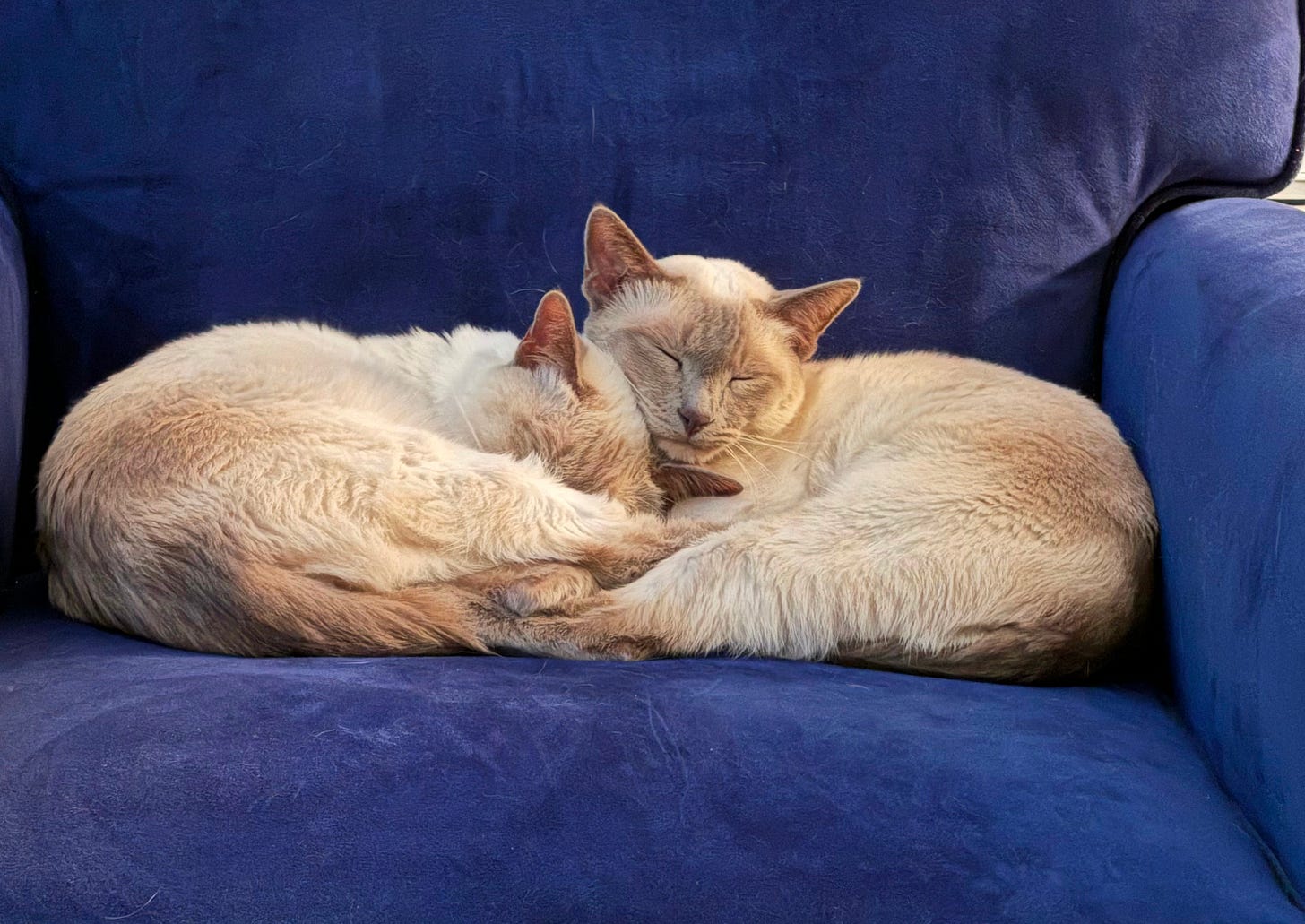
After Susan passed, many friends and acquaintances inquired about what I would be doing next. It's a simple question, but the answer is far from straightforward. Seventeen months have now elapsed since her passing, and I can now provide a response to that question for the current moment. This essay begins a four part series in which I first set the stage and then describe my three commitments about what I will be doing with my time and energy in the coming days and years. Before diving in, let me provide some context.
Understanding personal identity has been a passion of mine since my third undergraduate semester during which we marched through Erik Erikson's Eight Ages of Man [sic] in child psychology, sociology, and cultural anthropology all at once. I was fascinated by this first glimpse into the scope of human development across the life span, but also the by the richness of the way in which Erikson's concepts resonated across different social science disciplines. Over the course of my 50-year research career, many of my projects and publications directly or indirectly addressed the topic of identity. Erikson's work was always a touchstone, but I always viewed it as a starting point rather than a constraint.
Erikson's concepts comprise a theory. But the theory is also personal; the concepts provide a framework through which we can understand our own life journeys. Erikson's work, as well as that of hundreds of others who have built on it, describes the development of identity as an ongoing dialectic between exploration of opportunities and commitments to them.
I think of it as an ever-widening spiral of rounds where, for various reasons , we step back and reassess our situation, perhaps trying on new hats to see how well they fit, and then move into a period of relative stability, where we implement new commitments or reaffirm old ones. These commitments may be in areas in which we have choices, such as careers, religious or spiritual beliefs, political commitments, relationships, and so on -- as well as in areas we did not choose but must come to terms with: our race, ethnicity, gender, sexual orientation, or other aspects of our history, such as being adopted.
Erikson's last stage, Ego Integrity vs. Despair, says that our later years provide an opportunity for life review (a sort of exploration) and reaffirmation of existing commitments or commitments to new things.
That's the theory. And for me, now, the theory has become personal.
In the past few years, I have experienced several major life transitions, any of which by itself could evoke identity reconsideration. But I was hit simultaneously by three. Rather than feel a gentle tap on the shoulder, they hit me like a baseball bat on the head.
The first was retirement. For many people, retirement occurs at a fixed age, often 65. I still remember my father's retirement. He worked for a sales company that mandated retirement at 65. They threw him a little party, gave him a "crummy watch" (as he used to call it) and said some nice things -- he had worked there his entire adult life -- and then he cleaned out his desk, turned in his keys, returned the company car, and went home. Over and out.
In most academic institutions in the U.S., there is no fixed retirement age. You can keep going until you stop. The post-65 period can be quite awkward, because employers cannot discriminate on the basis of age -- so administrators can't actually ask you how old you are or when you actually plan to retire. Some people make a plan for themselves and gradually phase out. Others swear that they will never retire. As I was contemplating retirement, I asked a number of recently retired colleagues how they made their decision. Uniformly, I got some version of, "You'll know when the time is right." Well, that didn't feel at all helpful -- but now that I'm on the other side of it, I completely get it.
I pretty much blew through the 65 mark without even a thought. I had just started at my current institution when I was 60, and I still had a lot I wanted to accomplish. By the time I approached 70, I was being pulled in one direction by more intense administrative responsibilities but in another directions by my caregiving responsibilities to Susan, who had already retired. I "officially" retired a few years ago, but am even still on a post-retirement contract for a few hours a week until my successor arrives next summer.
The second transition was Susan's death in July, 2023. I have written in more detail about this in earlier posts (see especially "Life Happens" from 6-15-24). In the passing of a life partner, everything changes. Every mundane detail of one's life is different --- from how you get up to make morning coffee, to how you get ready for bed at night -- and everything in between. For me, it was the first time in my life that I had lived alone. In college, I always had a roommate; and Susan and I got married the day after we graduated. We had lived apart several times, when we held jobs in different cities -- but we were still connected and called or wrote pretty much every day. But now, I was really alone.
I didn't have to learn how to run a household. I was already pretty good at managing the cooking, shopping, cleaning, finances, and everyday tasks. But there was no one to share the day with, no one to watch Jeopardy with, or debate who should win Bakeoff or The Voice. No one.
That said, the house wasn't entirely empty. I had the good company of my beloved Golden, Gracie (RIP June 2024), and our two fun-loving and affectionate cats, George (aka George Harrison, Gorgeous George, Curious George) and Raffi (Raphael the Teenage Mutant Ninja Turtle, Raphael the painter, Raphael the Archangel). But they didn't care who should win Bakeoff, and they had no opinion about what color I should paint the bathroom or whether I should even bother.
The third transition took me most by surprise, and that was turning 75. Honestly, I hadn't had time to think about my age at all. I had the good fortune to be on a university campus working with vibrant young people whose enthusiasm energized me in the best ways. And I was so preoccupied by trying to navigate work and caregiving responsibilities, I just didn't have time to think about it. But when the number came up, it hit me that my time remaining on this earth is short. I hope I have a good long stretch remaining. But realistically, all good things do indeed come to an end. No one escapes death.
In response to that growing realization, I have been reading different things, including Atul Gawande's brilliant book, Being Mortal. (See prior discussion at my post, "God's Waiting Room" 6-30-24) I've also been reading more broadly in literature, poetry, spirituality, and philosophy -- often turning to the poetry of David Whyte and Mary Oliver, both of whom I have mentioned in prior essays (such as "Embracing Mystery," 9-11-2024). I've also been moved by poetry of Mike Speriosu, who writes on Substack at "Iterations." Some of his poems eloquently address our (tiny) place in the much larger universe, such as "In the Moment" (8-23-2024).
This trifecta of transitions has forced me out of the equilibrium of middle age commitments to work and family into a new twilight zone, where everything is up for grabs. It's actually a pretty classic Eriksonian identity crisis. People cope with identity crises in many different ways. I decided to step back and give myself some time to let it all sink in while assessing options. Should I move to be closer to one of my kids? Should I sell the house and move into a community? Should I travel? Should I sign up for a dating app? Should I trade my sensible Subaru for a sports car? ... Too many shoulds.
I recall a conversation with a wise friend during which I was debating where I should live, and I commented that I wasn't sure where I would fit in. I thought perhaps he would help me think through pros and cons of different options. Instead, he totally disarmed me by asking, "Where would you like to fit in?"
Oh! There's no should or must -- the real question is what would I like to do, where would I like to be. In Mary Oliver's terms,
"Tell me, what is it you plan to do
with your one wild and precious life?"
(from "The Summer Day", c 1992)
Another dear friend emboldened me to read Walt Whitman -- oh yes! What will I do with those amazing ideas??!!
At the last session of an 8-week grief support group I attended, the facilitator asked us to think of our lives as chapters in a book, and to decide what the title for our next chapter would be.
I instantly wrote, "Transformation," and, at that moment, it seemed just right.
But as I moved ahead with this transformative process, it felt like something even more radical was happening, and now I would call it Re-birth.
In these last months, I have had the opportunity to explore ideas, talk with friends and family, make tentative plans, and sit patiently with them to see how well they fit.
Moving forward, I have made three commitments for how I will allocate my precious time and energy during this next phase of my life: Singing, Writing, and Deepening Relationships. Each of these will be the topic of an upcoming essay, and I'm very excited to share my thinking with you. For me, the writing process is not simply about writing something down that is already fully formed in my mind. Writing involves interaction between my inner thoughts and the words that show up on the paper or the screen -- my thoughts become clarified as I write them down and re-shape them in real time. So these upcoming essays will both reflect these commitments and help me clarify them for myself.
I do continually ask myself whether anyone else would possibly care about these reflections. And then I recall the podcast I heard, featuring a panel of seasoned writers responding to aspiring writers who were calling in for advice. Those experienced writers had often asked themselves that very same question. But one of them shared the sentiment that, even if one person benefited from what they had written, then they would consider it to have been worthwhile. My writing on this site is offered in that spirit.
I welcome your thoughts on any of this. Also, if you would like references to any of my professional writing on identity development, just let me know (in a comment or Substack chat) and I will happily share references or pdfs with you.
By the time I post my next essay, I will have had my second cataract surgery and will hopefully have better vision -- both for seeing objects and for seeing the future ahead of me.






Dear Hal, thank you. I have so many feelings and thoughts whirling as I read your latest piece, My Three Commitments. The first was a kind of joy (I know, a strange reaction) to hearing your mention of Erik Erikson, as his work was also the theoretical foundation of my doctoral dissertation (an acknowlegement of the context for our shared overlapping journey). His brilliance in capturing and providing a framework for understanding human development never fails to inspire me (and give hope when in the midst of the next phase!). Thanks again for his reference, as he feels like an old friend.
Hearing you so beautifully place your lived experiences (past, present & future) into Erikson's framework does indeed provide a context for understanding - and appreciating - your life, Hal.
May I offer an additional layer of context? And that is contribution. By this I mean (hello our friend, Erikson) the impact of our interactions with others in the social world (aka, development). In your essay, you brilliantly shared from your point of view (the only one you could share from) but there is more, much much more. And that is the realm of the impact you have made in the lives of others.
For me, the impact came through social interactions that began with Dr. David Olson when I met him through my work as a then social worker in the field of adoption. David introduced me to you, Hal, and your impact on my life and career had begun. Who could have imagined that those two steps in the social interactions of my life at that time (David to you 20 years ago) would lead to my master's degree and on to other life-altering social interactions (i.e., Dr Paul Rossenblat, who would serve as my doctoral advisor)...and my work, also with Erikson's human developmental theory in intimate relationship development in young adulthood!
My point here, Hal, is to say...Wow! What a huge and impactful life you have lived, Hal! And my story is only ONE story of the thousands of lives you have touched over your 50 year academic career, not to mention your life with Susan, your sons, family and friends throughout your life.
My prayer for you today is that you allow yourself to FEEL the impact of a beautiful life well-lived ( a la, Mary Oliver's invitation, What will you do with this one precious life?).
Thank you, Hal! And here's a proverbial glass raised to your next chapter! Celebrating you, Jane
Hal, I can't tell you exactly which tendon this piece touched ("it's complicated") but I can thank you for writing it, even though I'm over here bawling like a an infant who has just learned she is no longer in the womb...because everything is about the ephemeral nature of this current existence. Everything is rebirth, isn't it?